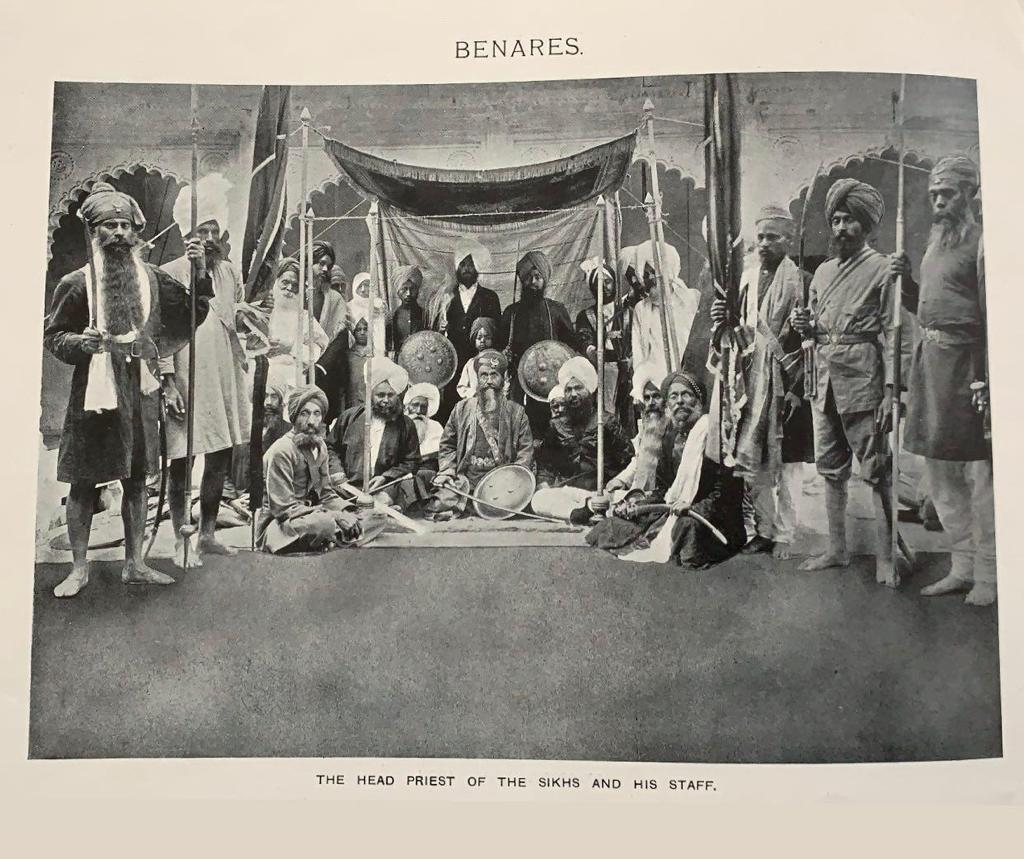Sumer Singh on:
[Wikipedia]
[Google]
[Amazon]
Sumer Singh (1847-1903) was a


Sikh
Sikhs ( or ; pa, ਸਿੱਖ, ' ) are people who adhere to Sikhism, Sikhism (Sikhi), a Monotheism, monotheistic religion that originated in the late 15th century in the Punjab region of the Indian subcontinent, based on the revelation of Gu ...
historian, a writer and poet of Braj literature
Braj literature is literature in Braj Bhasha, one of the Western Hindi languages developed as a literary language during the 15th century, Bhakti Movement as a form of devotional songs in praise of Krishna. It is often mystical in nature, rela ...
, interpreter of Sikh Scripture, and teacher. Sumer Singh was called ''Sahibzada
Sahib or Saheb (; ) is an Arabic title meaning 'companion'. It was historically used for the first caliph Abu Bakr in the Quran. The title is still applied to the caliph by Sunni Muslims.
As a loanword, ''Sahib'' has passed into several langua ...
'', prince, and ''Bābā'', because of his direct lineage to the Bhalla clan, associated with Guru Amar Das.
Titles
For some time he also was the ''Mahant
Mahant () is a religious superior, in particular the chief of a temple or the head of a monastery in Indian religions.
James Mallinson, one of the few westerners to be named as a mahant, describes the position of a mahant as a combination of an ...
'' (now termed Jathedar) of the Takht Sri Patna Sahib. He was Mahant of Takht Patna Sahib between the years 1882 to 1903. He also served as the chairman of the Faridkot Teeka Committee, overseeing the writing of the Faridkot Teeka.
Works
Mahan Kosh lists Sumer Singh's works as including: Khalsa Shattak, Gurpad Prem Prakash, Khalsa Panchasika, Gurkeerat Kavitavali, Gurcharit Darpan, Prem Prabhakar, Brahmand Puran, Makke Madine Di Gosht, Sumer Bhushan. A master poet, Sumer Singh's Gurpad Prem Prakash (1881) is a narrative life story onGuru Gobind Singh
Guru Gobind Singh (; 22 December 1666 – 7 October 1708), born Gobind Das or Gobind Rai the tenth Sikh Guru, a spiritual master, warrior, poet and philosopher. When his father, Guru Tegh Bahadur, was executed by Aurangzeb, Guru Gobind Sing ...
and has been recently published in 2000 by the Punjabi University, Patiala, Publication Bureau, edited by Dr. Achhar Singh Kahlon.
Valerie Ritter (2010) writes that,
:"Many of Sumersingh's publications were Sikh in subject matter, though other subjects and genres were also represented. One, for instance, consisted of ''kundaliyas'' based upon the more Krishnaite and ''riti''-oriented Bihari '' Satasai''. He wrote other pieces on poetic ornament (alamkara), couplets (dohas) on Sikh topics, and a commentary on the '' Japji Sahib''. Shivanandan Sahay remembered him as a bhakta of Tulsi's Avadhi ''Ramcharitmanas
''Ramcharitmanas'' ( deva, श्रीरामचरितमानस, Rāmacaritamānasa), is an epic poem in the Awadhi language, based on the ''Ramayana'', and composed by the 16th-century Indian bhakti poet Tulsidas (c. 1532–1623). This ...
'' as well, which he edited at the Press along with a commentary on the ''Manas'' by yet another Sikh author."Valerie Ritter, ‘Networks, Patrons, and Genres for Late Braj Bhasha Poets’, In Before the Divide: Hindi and Urdu Literary Culture, 249–276. New Delhi: Orient Blackswan, 2010. Page 258

Social Contributions
Ritter (2010) comments on the extrodinary life lived by Sumer Singh, :"the extensive network that Sumersingh moved in for religious, literary and, presumably, business purposes, deserves note. Mahant at Patna, litterateur in Varanasi, frequent visitor to the Punjab, and local intellectual in Nizamabad, Sumersingh moved fluidly between and within regions, and in varying social circles, ranging from the wealthy city merchant class of Varanasi, Brahmins in the districts, and English sahibs." Sumer Singh founded the Patna-Kavi-Samaj, at the request of Patna University students, where he mentored students on their poetry. Sumer Singh mentored and taught an esteemed poet,Ayodhya Prasad Upadhyay
Ayodhya Singh Upadhyay ‘Hari Oudh', (15 April 1865 – 16 March 1947) was a writer of Hindi literature. He was the Chairman of the Hindi Sahitya Sammelan and had been conferred the title of Vidyavachaspati.
Life
He worked in the Hindi Depar ...
, who took the penname, nom-de-plume, Hariaudh from the inspiration of Sumer Singh's pen name, 'Sumer Hari'.
Sumer Singh viewed poetry as a way to connect, and break divisions between Hindu, Muslim, and Sikh, as his student Ayodhya Prasad Upadhyay
Ayodhya Singh Upadhyay ‘Hari Oudh', (15 April 1865 – 16 March 1947) was a writer of Hindi literature. He was the Chairman of the Hindi Sahitya Sammelan and had been conferred the title of Vidyavachaspati.
Life
He worked in the Hindi Depar ...
writes:
:"...in the subject of his poetry (Sumersingh) had great hopes. He wanted his poetry to be spread among the public, and he said that the destruction of differences between Sikhs and Hindus might be accomplished by this means."
Sumer Singh was politically involved with Khem Singh Bedi
Khem Singh Bedi KCIE (21 February 183210 April 1905) claims he was a direct descendant of Guru Nanak, a leader, founder of the Singh Sabha in 1873. It instituted many charitable causes for Sikhs, was a landowner and politician in the Punjab durin ...
and others of the Amritsar Singh Sabha in planning to resurrect Sikh rule in Punjab, but their plans were destroyed by the British along with the support received by the Lahore Singh Sabha.Oberoi, Harjot. 1994. The Construction of Religious Boundaries: Culture, Identity, and Diversity in the Sikh Tradition. Delhi: Oxford University Press. Page 377

References
{{improve categories, date=June 2023 1847 births 1903 deaths